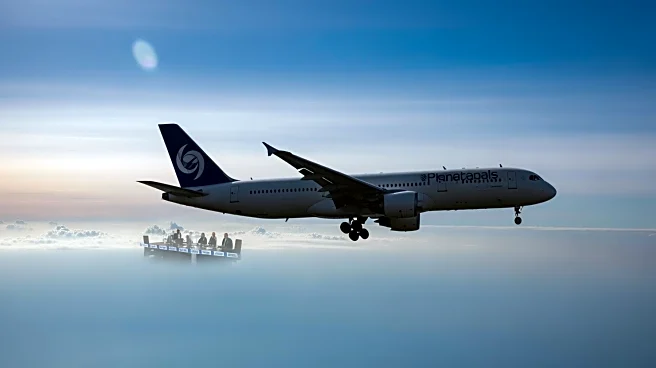What's Happening?
American Airlines has taken delivery of its first Airbus A321XLR, marking a significant milestone as the first U.S. carrier to receive this advanced aircraft. The A321XLR, known for its extended range capabilities, is expected to open up new long-haul
routes that were previously not feasible with narrow-body jets. Initially, American Airlines was scheduled to receive these aircraft starting in 2023, but delays in certification and supply chain issues postponed the deliveries. The first A321XLR was delivered in July 2025 but was stored in the Czech Republic due to interior fitting delays. The aircraft is now en route to the United States, specifically to Dallas Fort Worth International Airport, signaling progress in overcoming these challenges.
Why It's Important?
The introduction of the Airbus A321XLR into American Airlines' fleet is poised to significantly impact the airline's operational strategy. With its long-range capabilities, the A321XLR allows American Airlines to explore new international routes that were previously not viable with existing aircraft. This could lead to increased connectivity and potentially boost tourism and business travel between the U.S. and other regions. The aircraft's premium cabin layout, including business and premium economy seats, aligns with American Airlines' strategy to enhance passenger experience and compete more effectively in the international market. The move also reflects broader industry trends towards utilizing more fuel-efficient and versatile aircraft.
What's Next?
American Airlines plans to debut the A321XLR commercially by early 2026, with initial operations focusing on premium transcontinental routes. As the fleet expands, the airline is expected to deploy these aircraft on long and thin international routes, particularly from the Northeast U.S. to Europe. This strategic deployment will likely involve pilot training and adjustments to existing route structures. The successful integration of the A321XLR could set a precedent for other U.S. carriers considering similar fleet upgrades, potentially influencing competitive dynamics in the aviation industry.
Beyond the Headlines
The acquisition of the A321XLR by American Airlines highlights the ongoing evolution in aircraft technology and its implications for airline operations. The focus on fuel efficiency and extended range capabilities reflects a shift towards more sustainable aviation practices. Additionally, the challenges faced in interior fitting underscore the complexities of modern aircraft manufacturing and the impact of global supply chain disruptions. As airlines continue to adapt to these changes, the role of technological innovation in shaping the future of air travel becomes increasingly evident.















